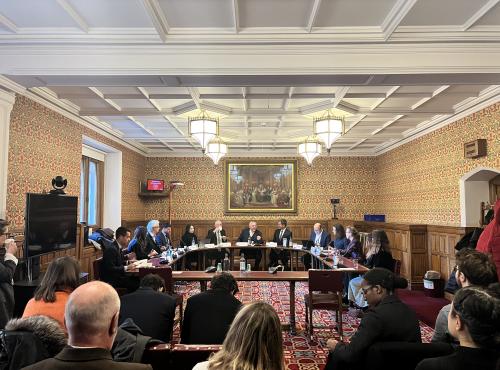The APPG for Data Analytics hosts first reactions event to the National Data Strategy
The National Data Strategy outlines the UK’s ambitions for data, setting out a vision to support the building of a data economy. It aims to ensure that people trust the data ecosystem, are skilled to use it and can access data when needed.
The All-Party Parliamentary Group for Data Analytics hosted a webinar on Tuesday 25th May to discuss first reactions to the newly-released strategy.
Eve Lugg, Policy Manager for Data Analytics at Policy Connect, said: “Following the launch of the NDS in 2020, the government opened the strategy for consultation. Policy Connect responded to this consultation with a letter to the Secretary of State, suggesting three areas for improvement:
- More emphasis to be placed on the ethics and standards which data collection and use should meet in order to develop public consent, cooperation and openness.
- Related to the issue of public trust, clearly define the critical role of local and regional authorities. Suggested a National Data Ethics Council
- A need for stronger focus on fairness and opportunity, by establishing “Equality” as a pillar in its own right in the up-front diagram.”
Daniel Zeichner MP, Chair of APGDA: “Data is a potentially transformative asset – the National Data Strategy allows us to think hard about how we use it, who benefits, and how we ensure we protect ourselves against misuse. With different approaches being taken in different parts of the world, we can both lead and learn from the experience of others.”
Lord Holmes, Co-Chair of APGDA: “I welcome the Government’s response to the consultation on the National Data Strategy but we need a greater focus on inclusion. We have the most incredible opportunity to build back better but digital inclusion and improved infrastructure must be at the heart of our efforts; we must build back better together.
“We need far more public engagement and public connection in this debate, to enable citizens with the tools and resources to engage with their own data and building trust.”
Dr Mahlet Zimeta, Head of Public Policy at the Open Data Institute: “In today’s economy, every business and organisation is a data business and organisation, so every sector has a lot to gain from better data availability.
“I am pleased to see the discussion around compliance with the Equality Act and the responsible use of data in the NDS. That said, the NDS is an opportunity to think more holistically and ambitiously around equality and the inclusive society that we want to build. We need to consider ways in which data and associated digital technologies can actually redress social inequalities, and now just how they might worsen them.”
Karen Foster, Executive Director of Data at Jisc: “We really welcome this strategy overall. Where we felt the NDS could go further is around data poverty and digital inclusion, as we recover from the pandemic we are likely to continue a blended form of remote and face to face learning for quite some time and could do more to support students. One example is access to Wi-Fi with the OfS research highlighting that 52% of students are impacted by slow and poor wifi. This strategy could look at how we build out the network.”
The recommendations made by Policy Connect in response to the NDS consultation reflect the priorities of the wider APGDA programme. The APGDA recognises the importance of public trust, transparency, accessibility and inclusivity in technology as well as the need for good data and will continue to prioritise these throughout the wider programme.
Policy Connect is a cross-party think tank with four main policy pillars; Education and Skills; Industry, Technology & Innovation; Sustainability and Health & Accessibility. The All-Party Parliamentary Group on Data Analytics (APGDA) is one of the parliamentary groups supported by Policy Connect; a cross-party group chaired by Daniel Zeichner MP. The group aims to connect Parliament with business, academia and civil society to promote better policy making on big data and data analytics.





